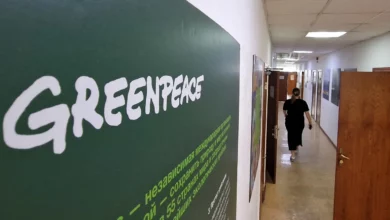
The few articles that refer to the environment in the newly-passed Constitution have caused disappointment within the community of environmental experts and activists.
Mohamed Kawashty is the founder and general coordinator of the National Project for Cultivating Egypt and a national campaign against burning rice straw, a major cause of pollution. He says campaign members were shocked at how marginalized environmental concerns were in the new Constitution.
After scrutinizing the various articles that tackled the environment, they decided to submit a report to the Constituent Assembly, in which they highlighted the main problems and included remarks and suggestions. They will submit something similar to the Parliament following elections.
Kawashty — whose campaign stopped 570,000 tons of rice straw from being burned in 2011 and 2012 in about 150 villages — says Article 69, the main article on the environment and its resources, is not based on any real understanding of the country's serious environmental problems.
Mentioned in Chapter Three, which deals with economic and social rights, the article says: “All individuals have the right to a healthy environment. The State shall safeguard the environment against pollution, and promote the use of natural resources in a manner that prevents damage to the environment and preserves the rights of future generations.”
No plan in sight
“Unfortunately, this article emphasizes the people’s right to a clean environment without mentioning any future comprehensive plans or strategies for achieving that, or defining any duties or commitments the citizens, factories and other institutions must adhere to in order to maintain this environment,” he says. “This sentence should have been followed by defining the pollution and destruction of the environment as a serious crime that must be punished by law.”
Kawashty says the article highlights the state’s role in being the sole, de facto defender of the environment, ignoring the major part played by civil society and grassroots movements. He argues the article should be changed to say, “The State, with the help of civil society, must commit to building an integrated strategy that can enable us to eradicate all pollution problems within a specific period of time.”
“While countries across the world attempt to save their natural resources and provide alternative solutions, the environment articles in our new Constitution are general, giving the right to use natural resources without any regulated commitment from the citizen or state,” he notes.
Kawashty says it should have mentioned the importance of rationalizing resource consumption and finding new, alternative resources.
One of the main problems is the lack of communication and coordination with the Environment Ministry and other government institutions, he says.
He gives an example, saying that on 31 December, the ministry announced the construction and operation of five incinerators in five governorates, including Assiut and Sohag.
“Thirty-eight minutes into the conversation, the Health Ministry announced its intention to replace these incinerators with mincing machines to get rid of medical waste,” he says.
He argues that the lack of coordination and organization leads to “continuous contradictions” between different government bodies.
“The Constitution should have emphasized the importance of cooperation and coordination between the different governmental bodies to protect the rights of coming generations,” he adds.
Mostafa Fouda, Egyptian Environmental Affairs Agency adviser for biodiversity and natural reserves, says the environmental articles in the Constitution fall short. He wonders how there wasn’t an environmental expert on the drafting committee.
“It was very important to include a special article about sustainable development stating its different social, economic and environmental aspects,” he says. “Also, it was essential for the natural parks and protected areas to be a strong part of the Constitution. Unfortunately, a lot of people still look at the environment as a luxury.”
Fouda says he surveyed the articles related to the environment in 20 other constitutions from around the world, and made a proposal for the one on protected areas.
But even though he submitted about 1,000 copies of his proposal to the Constituent Assembly and other government bodies responsible for creating the Constitution, he says, no one seemed to care.
Ahmed Droubi of Greenpeace Arab World says most constitutions drafted in different countries in the last decades have dedicated a complete chapter to the environment. These chapters state duties and rights in detail, not simply in brief, separate articles, as in the new Egyptian Constitution.
With the help of a group of consultants and environmental experts and activists, he provided a proposal to the Constituent Assembly emphasizing the importance of genetic resources of plants and animals, and considering nature and biodiversity as public property. They specified that monopolizing or exploiting these resources without permission was a serious crime that should be punishable by law.
They also stated the great role the state must play in protecting the local environment and its unique natural habitats, as well as paying special attention to setting specific environmental criteria for using and building on Egyptian lands.
But he says the assembly made no use of the group’s suggestions.
Kawashty asserts that current laws and legislation must also be activated, such as one that prohibits burning garbage and solid waste, with lawbreakers facing a year of prison or a LE5,000 fee.
The Environment Ministry monitored about 1,370 cases of violations between 9 September and 18 October alone, Kawashty says, and “surprisingly, no one was punished.”
Fouda says old laws need to be updated and developed to keep up with scientific progress and new technology. He says it’s important to have laws about sustainable development and genetically modified organisms, for example.
“People need to understand that eco-tourism means responsible tourism, which prevents polluting the environment, destroying coral reefs or throwing garbage and waste,” Fouda says. “They need to understand that having a healthy environment and healthy food are very important aspects of human rights.”
This piece was originally published in Egypt Independent's weekly print edition.




